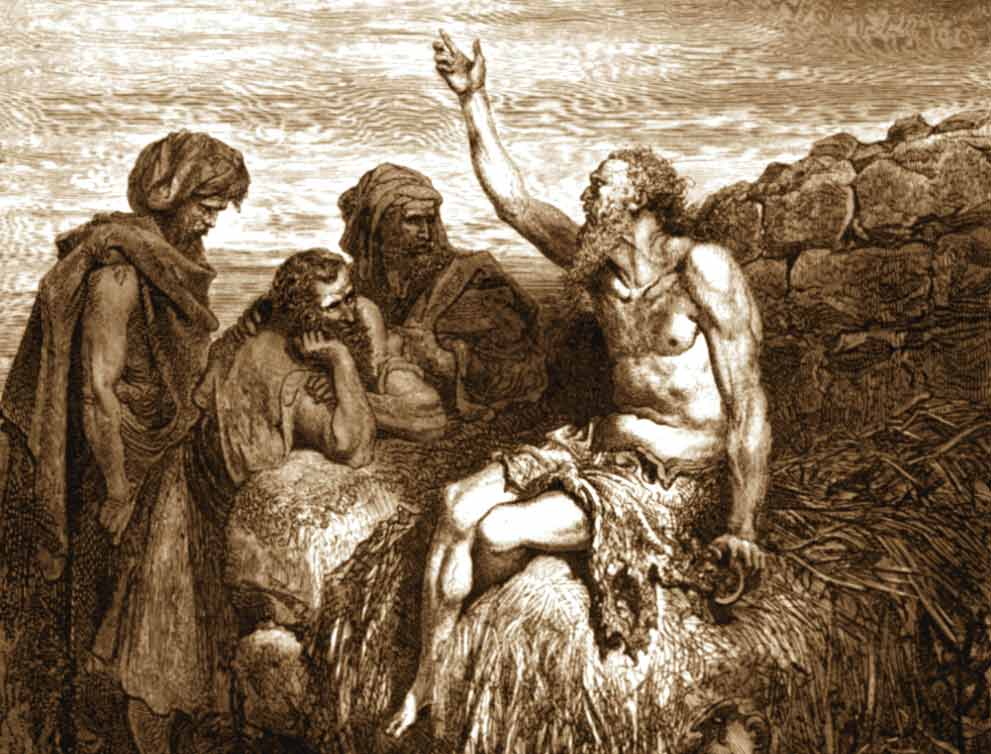
Chapter 26 (Fourth Sunday of Lent)
‘How you have helped one who has no power!
How you have assisted the arm that has no strength!
How you have counselled one who has no wisdom,
and given much good advice!
With whose help have you uttered words,
and whose spirit has come forth from you?
The shades below tremble,
the waters and their inhabitants.
Sheol is naked before God,
and Abaddon has no covering.
He stretches out Zaphon over the void,
and hangs the earth upon nothing.
He binds up the waters in his thick clouds,
and the cloud is not torn open by them.
He covers the face of the full moon,
and spreads over it his cloud.
He has described a circle on the face of the waters,
at the boundary between light and darkness.
The pillars of heaven tremble,
and are astounded at his rebuke.
By his power he stilled the Sea;
by his understanding he struck down Rahab.
By his wind the heavens were made fair;
his hand pierced the fleeing serpent.
These are indeed but the outskirts of his ways;
and how small a whisper do we hear of him!
But the thunder of his power who can understand?’
Commentary
In order to perceive the true answer to the “why” of suffering, we must look to the revelation of divine love, the ultimate source of the meaning of everything that exists. Love is also the richest source of the meaning of suffering, which always remains a mystery: we are conscious of the insufficiency and inadequacy of our explanations. Christ causes us to enter into the mystery and to discover the “why” of suffering, as far as we are capable of grasping the sublimity of divine love.
In order to discover the profound meaning of suffering, following the revealed word of God, we must open ourselves wide to the human subject in his manifold potentiality. We must above all accept the light of Revelation not only insofar as it expresses the transcendent order of justice but also insofar as it illuminates this order with Love, as the definitive source of everything that exists. Love is: also the fullest source of the answer to the question of the meaning of suffering. This answer has been given by God to man in the Cross of Jesus Christ.
People react to suffering in different ways. But in general it can be said that almost always the individual enters suffering with a typically human protest and with the question “why”. He asks the meaning of his suffering and seeks an answer to this question on the human level. Certainly he often puts this question to God, and to Christ. Furthermore, he cannot help noticing that the one to whom he puts the question is himself suffering and wishes to answer him from the Cross, from the heart of his own suffering. Nevertheless, it often takes time, even a long time, for this answer to begin to be interiorly perceived. For Christ does not answer directly and he does not answer in the abstract this human questioning about the meaning of suffering. Man hears Christ’s saving answer as he himself gradually becomes a sharer in the sufferings of Christ.
The answer which comes through this sharing, by way of the interior encounter with the Master, is in itself something more than the mere abstract answer to the question about the meaning of suffering. For it is above all a call. It is a vocation. Christ does not explain in the abstract the reasons for suffering, but before all else he says: “Follow me!”. Come! Take part through your suffering in this work of saving the world, a salvation achieved through my suffering! Through my Cross. Gradually, as the individual takes up his cross, spiritually uniting himself to the Cross of Christ, the salvific meaning of suffering is revealed before him. He does not discover this meaning at his own human level, but at the level of the suffering of Christ. At the same time, however, from this level of Christ the salvific meaning of suffering descends to man’s level and becomes, in a sense, the individual’s personal response. It is then that man finds in his suffering interior peace and even spiritual joy. (Pope St. John Paul II; Salvific doloris)
How great a being, which doth all beings keep
Thy knowledge the only line to sound so vast a deep
Thy time is now and evermore, Thy place is everywhere
Let dust in dust and silence lie
Sing, sing, ye heavenly choir
Then shall I bear a part with that celestial choir.
God our Creator,
show forth your mighty works
in the midst of your people.
Enlighten your Church,
that we may know your Son
as the true light of the world
and through our worship confess him
as Christ and Lord,
who lives and reigns with you in the unity of the Holy Spirit,
holy and mighty God for ever and ever. Amen.